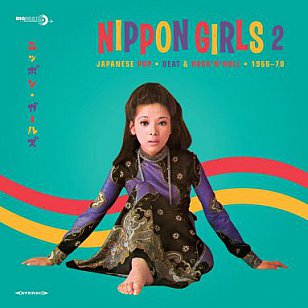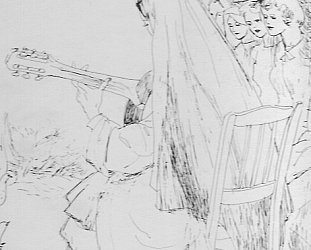Graham Reid | | 1 min read
Linda Yamamoto: Furi Furi 5

From the same New Zealand distributor (Border, see here) as brought us the largely terrific Girls With Guitars album comes this, subtitled "Japanese Pop, Beat and Rock'n'Roll 1966-70".
(Others in the series are "Pop, Beat and Bossa Nova")
Although the Japanese very quickly got the original rock'n'roll of the Fifties (guys like this) and of course the Beatles, their definition of "beat" and "rock'n'roll" during this period -- when it came to women singers -- was rather more muted and MOR.
If you come here looking for upbeat pop of the Lulu/Cilla Black spin-off or the trickle-down of raw, Fifties rock'n'roll, you are going to be sorely disappointed.
What mostly dominates here is orchestrated pop, at a pinch we might say influenced by James Bond soundtracks, as on the English language Namida No Go Go by Emy Jackson (aka Emy Eaton from Essex who spent her teenage years in Yokohama).
Delightful though it is, the soft shuffle of Kazumi Yasui on Warui Kuse is also lite-lite bossa and has somehow slipped in here like some geisha from Ipanema.
Although Mari Henmi sounds a right saucy one on Daniel Mon Amour: that French title, her awkward stab at the Frang-language and the sexual moaning at the end suggesting she and the songwriters had heard Serge Gainsbourg's Je t'aime.
The second side -- yes, this comes as deliciously red vinyl in an informative gatefold sleeve ripe for framing -- picks up the pop-beat end with Katsuko Kanai on the surf-rock-influenced Mini Mini Girl (and I'll be damned if at a couple of points she doesn't sound like Yoko Ono, when Yoko was actually singing her political ballads).
There's also a rather decent stab at faux-soul on Boy and Girl by Akiko Wada who is pictured on the inside sleeve in black and astride a motorbike . . . and was apparently mistaken for a male on account her towering height -- a bare 5'9" -- and masculine looks.
But if there's a male in this chick-pop, it's undoubtedly Kemeko Matsudaira whose garageband-cum-guttural kiddie pop Watashi Go Kemeko Yo raises the bar on weird.
But mostly it seems the people behind the Japanese girl-pop boom -- and we might presume they were all men -- were in thrall of surf guitars and having orchestration available because there was serious money flying around in Tokyo after the international success of Kyu Sakamoto and his wondefruly catchy Sukiyaki.
Nanida No Mori No Monogatari by Akiko Nakamura seems especially held captive by this.
There was much more weird and noisy stuff coming out of Japan during this period. I can't vouch whether it came from "Nippon Girls" . . . but . . . "if you wanna hear because this place is hot . . ."





post a comment